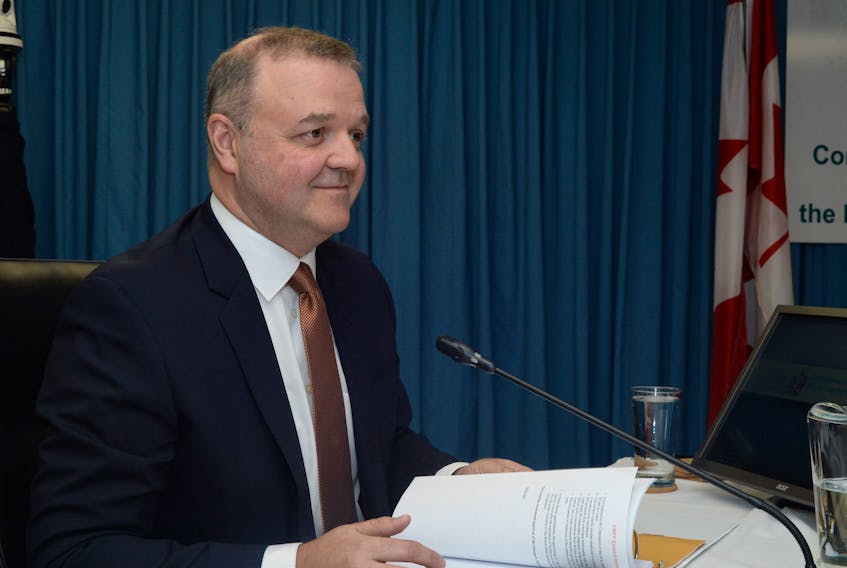Lawyer Todd Stanley testified at the Muskrat Falls Inquiry Monday about his time with the Department of Justice pre-project sanction, including about the irritation expressed at the time by some bureaucrats over the relationship between Nalcor Energy and the Premier’s Office.
“Everybody’s advice and opinions were solicited and heard, so it wasn’t like people (in government) were completely avoided in making decisions,” Stanley said during questioning.
“It’s just that at times, especially in the early days, there was a view that there were people that perhaps didn’t get a chance to have their say before a discussion occurred.”
He said there was “friction,” frustration “for lack of a better term,” relaying feelings expressed to him by mid-level staff. He suggested it was not his personal view.
He did say Nalcor was seen as “guarding” project information at times, even if information was ultimately made available to the government.
Stanley was a lawyer in the Department of Justice, acting as solicitor for the Department of Natural Resources from about 2001 to 2013. He was later promoted and remained with the government until May of this year, when he made the move to the private firm Cox and Palmer.
He said the issue of friction appeared within the Department of Natural Resources, tied to who was involved in the first discussions with the minister and premier on a given topic. He said it was not a case of the tail wagging the dog, as he saw it, and subject matter experts within government were able to provide input before final decisions were made and orders issued.
He also put forward some other reasons for the tension in the ranks, including the differences between career civil servants who were facing calls for tighter departmental budgets, and staff at Hydro Place who were part of the relatively new entity, hiring rapidly for its power megaproject.
Nalcor was unique amongst the province’s Crown corporations in that president and CEO Ed Martin and others from the corporation were called far more often to meetings on the eighth floor of Confederation Building in St. John’s — the premier’s boardroom.
“Part of that is a function of the fact that Nalcor — and we’re talking say 2009, 2010, 2011 — was a growing entity evolving into various areas. Most of government’s other Crown corporations are steady state operations,” Stanley said.
At one point Erin Best (representing former premier Kathy Dunderdale) asked if the meetings on the eighth floor involving Nalcor could be considered indication of heightened oversight and interest.
“Yes, you could put it that way,” Stanley replied.
He said he was personally concerned about oversight from another angle. He had suggested setting up a project office within the government, as a clearing point for all things Muskrat Falls for the purpose of oversight. It was before the “oversight committee” was established in 2014.
Stanley also expressed concern about Justice resources, but said he didn’t formally propose any new oversight office at budget time, or have people in Justice responsible for budgeting make requests.
In terms of governing legislation, Nalcor Energy was required to report periodically to the government through the minister of Natural Resources. That department was responsible for oversight.
At one point, Stanley said that some staff in the department felt there was an assumption by Nalcor that department staff were only “cheerleaders” for the Muskrat Falls project.
“(But) I don’t want to use the word cheerleader because it’s not the right term,” he said, searching for a word.
Wording became an issue, as Stanley sought specific language, but also lawyers made reference to terms he had used in an earlier interview with commission co-counsel. At that interview, he made reference to a “runaway train,” to Nalcor being a “fiefdom” and to the Crown corporation being viewed by government leadership as “the best thing since sliced bread.”
He admitted to trying to walk back “flowery language” he thought might be misconstrued, but also said he did not contradict the earlier remarks.
Inquiry co-counsel Barry Learmonth said he felt there were contradictions, challenging Stanley to clarify, before asking Commissioner Richard LeBlanc to have the transcript of Stanley’s earlier interview entered into evidence.
The commissioner had already said he was interested in having the transcript, given how much it had been referred to by other lawyers, and ordered it entered into evidence.
RELATED STORIES:
FRAMPTON: Muskrat Falls with a vengeance
Muskrat Falls stop-work order worries workers









